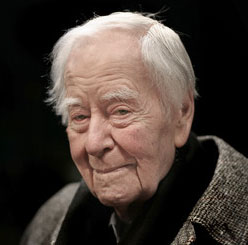Prize-Winning Playwright Horton Foote Donated His Papers to SMU
Award-winning playwright and screenwriter Horton Foote, who died Wednesday, donated his papers to SMU's DeGolyer Library.

Horton Foote, the Pulitzer Prize-winning playwright and Oscar-winning screenwriter who died Wednesday, had donated his papers and related materials to the DeGolyer Library at Southern Methodist University.
 Horton Foote (Photo courtesy of The Hartford Courant) See a slide show |
The Horton Foote Collection at SMU includes more than 200 boxes of material documenting the career of the playwright, author and film maker. The collection includes manuscripts, scrapbooks, hand-written drafts of screenplays, diaries, letters, photographs and family memorabilia of the Wharton, Texas, native who spent more than 60 years in film, stage and television.
"The sheer magnitude and diversity of his creative life is impressive," said Russell Martin, director of DeGolyer Library. "And he was an active writer to the end of his days. For all his success, he was also simply a good and gentle man. I don’t know of many writers of his stature who are able to retain the common touch. But he did. He had a broad and sympathetic vision, reflected clearly in his work and also in his personal associations. We shall miss him greatly—but his body of work will endure. We are honored to be the stewards of Horton Foote’s legacy here at the DeGolyer Library."
Foote won his first Oscar in 1962 for the screenplay of Harper Lee's "To Kill a Mockingbird" and his second for 1983's "Tender Mercies." He won a Pulitzer Prize for Drama in 1995 for his play "The Young Man From Atlanta," which was nominated for a Tony Award. His honors also include the National Medal of Arts in 2000.
"DeGolyer Library acquired Horton Foote’s papers in 1991, beginning a long and fruitful relationship," Martin said. “Almost every year since 1991, he would send us additional material for the collection.
"I’ll never forget visiting him once at his home in Wharton and he prepared freshly squeezed orange juice and scrambled eggs for me," continued Martin. "We then sat in his kitchen for hours and talked about, and solved, all the problems of the world, none of which were insurmountable when approached with his unique perspective, a magical combination of sympathy and irony. He loved the human voice, the stories we tell. No one listened any better."
In 2003, Foote received an honorary Doctor of Humane Letters degree from SMU and was the focus of an exhibition at the DeGolyer Library, "Horton Foote and The Trip to Bountiful, 1953-2003." The exhibition was accompanied by a publication written by Ronald L. Davis, Roots in Parched Ground: An Interview with Horton Foote.
"Over and over again, in plays and screenplays such as 1918, The Chase, and The One-Armed Man, he tackles the themes of randomness, redemption and resilience. . ." read the citation for his honorary degree. "For his achievements as a writer, for his pioneering contributions to American theater, television and independent filmmaking, and for helping us to understand the depths of human emotions and the contradictions in the human condition, SMU is honored to award Horton Foote the degree of Doctor of Humane Letters, honoris causa."
Foote died in his sleep in Hartford, Conn., on Wednesday afternoon. He was 92. In recent years, he had lived in Pacific Palisades, Calif., and Wharton.
# # #